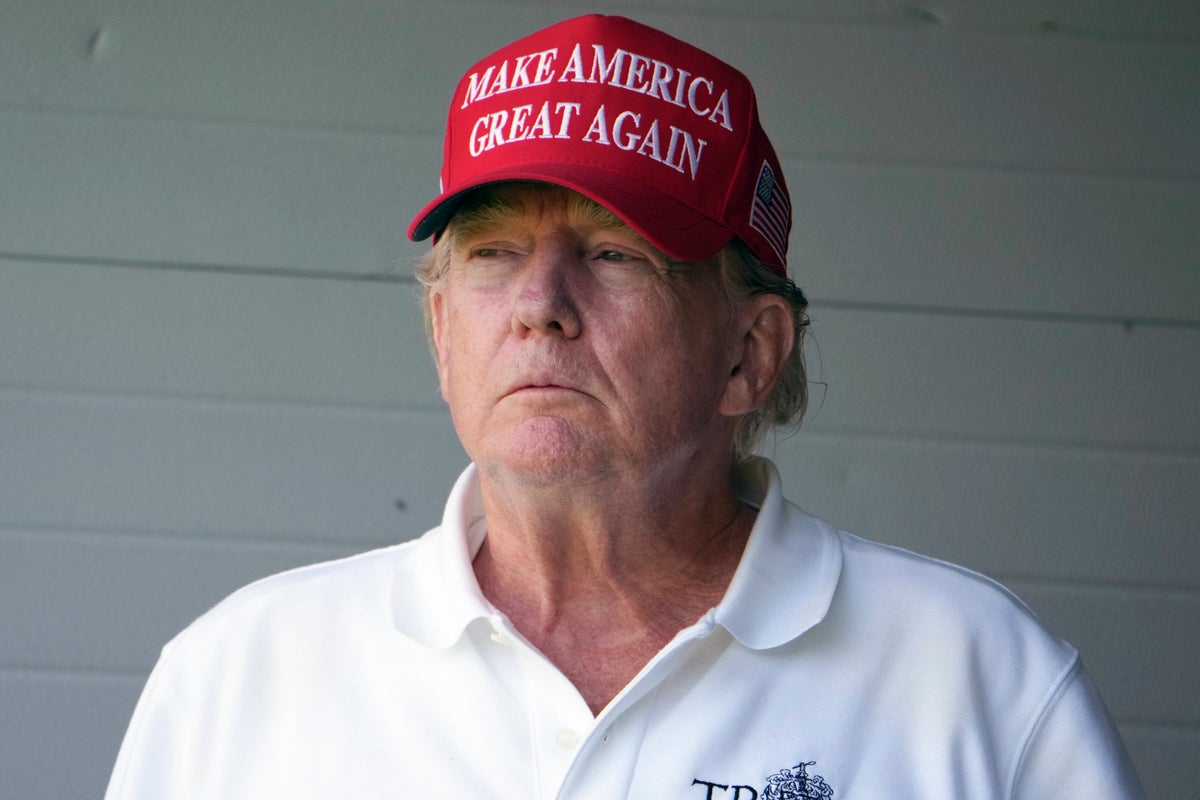
Donald Trump waived his formal arraignment in his election interference case in Georgia – a move that means he can now avoid what would have been his first televised court hearing.
The former president pleaded not guilty on 31 August to the slew of 13 charges accusing him of running a criminal enterprise to stay in power at all costs.
“As evidenced by my signature below, I do hereby waive formal arraignment and enter my plea of NOT GUILTY to the indictment in this case,” the filing states.
The arraignment was slated to take place in Fulton County court on 6 September.
It would have been the ex-president’s fourth after a grand jury in Georgia indicted the ex-president and 18 other defendants on various charges related to their alleged efforts to change the outcome of the 2020 election in the state. The charges stem from a years-long investigation by Fulton County District Attorney Fani Willis.
Mr Trump has been indicted four times this year.
The former president was first criminally indicted in New York over allegedly falsifying business records to conceal hush money payments, secondly federally indicted over his alleged mishandling of classified documents, then federally indicted for his efforts to overrun the 2020 election and finally the Georgia election interference case.
For his part, Mr Trump has strenuously denied any wrongdoing and repeatedly insisted that he is the victim of a costly “witch hunt” by the Joe Biden administration, which he claims has weaponised the US justice system against him in order to thwart his proposed political comeback.
What is a grand jury?
In the American legal system, a grand jury is simply a group of randomly selected American citizens called upon by the federal or state laws of the United States to conduct legal proceedings, chiefly to weigh the evidence in a criminal case to determine whether there is a sufficient basis under which charges should be brought.
Unlike a trial, a unanimous verdict is not required. Typically, just 12 of a 16 to 23-strong grand jury needs to vote to indict a person for it to take place.
All proceedings surrounding grand juries are secret in accordance with Rule 6(e) of the Federal Rules of Criminal Procedure and the burden of proof for prosecution is lower than it is at a trial, with only a majority belief in “probable cause” needed to secure an indictment.
What is an indictment?
Should a grand jury conclude in favour of issuing formal charges, an indictment is then issued to the subject, which serves as formal notice that the state has reason to believe that person has committed a crime.
An indictment does not determine guilt or innocence but is a required procedural step in a criminal proceeding.
What is an arraignment?
After the state secures an indictment, it can take a case forward to an arraignment.
At an arraignment hearing, which takes place before a judge, defendants are read the charges facing them and the maximum penalties they carry and then are offered the opportunity to make a plea — either not guilty, no contest, or guilty.
If the defendant pleads guilty or no contest, the case most frequently moves to sentencing.
If the defendant pleads not guilty, the judge will set the terms of bail and the dates for subsequent events in the case, including any pre-trial hearings and an eventual trial, which can sometimes occur months or years after the initial charging date.
Mr Trump was arraigned in New York in the state case on 4 April, in Miami in the first federal case on 13 June, again in Washington in response to the second federal indictment on 3 August.
He and his co-defendants were expected to be arraigned on 6 September in the Georgia indictment before they entered a plea and waived their arraignments.
So where is Trump in all of this?
The former president has already been indicted four times. Once by Manhattan district attorney Alvin Bragg for his alleged role in the hush money scheme. Twice by Mr Smith, the first time for his alleged mishandling of classified documents in Florida and the second for his alleged efforts in trying to overturn 2020 election and subsequent insurrection. Then by Ms Willis for his alleged role in trying to overturn election results in Georgia.
The former commander-in-chief pleaded not guilty in all instances.
Mr Trump was released after three arraignments, the fourth pending, and is not expected to be held in jail while awaiting a potential trial in either case.
He is, of course, running for the presidency again and is the current runaway leader in the polls for the Republican presidential nomination, leaving the likes of Ron DeSantis, Mike Pence, Nikki Haley, Tim Scott and Chris Christie trailing in his wake, which could make things interesting going forward.
The dates of his trials will likely intersect with his campaigning schedule.
Judge Chutkan has set his federal 2020 election interference trial date to begin on 4 March 2024 in Washington DC. Judge Cannon has chosen 20 May 2024 as the start date for Mr Trump’s classified documents trial in Florida. His hush-money payment trial is set for 25 March 2024 in Manhattan.







